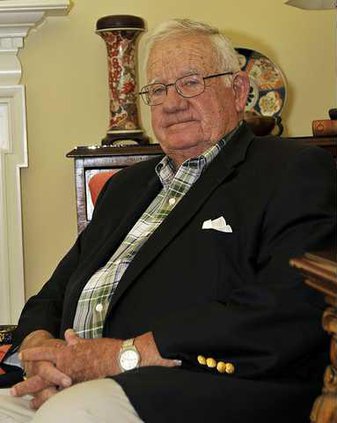His family had left for a beach trip. Shaving in front of the bathroom mirror, Smith had turned on the radio for the morning news, not expecting what he heard.
While Smith was sleeping, Robert F. Kennedy had been shot in the head in the Ambassador Hotel in Los Angeles. Early the next morning, June 6, Kennedy was dead.
For Smith, it was a moment of profound sadness. "I couldn’t help but burst out crying," Smith said.
There was an interesting connection between Sid Smith and Bobby Kennedy that began 22 years earlier.
Smith went to Harvard in 1941. In his freshman year, World War II began. Smith played on the 1942 football team and left the following spring to serve in the war. He returned from the war in 1946 and came back to Harvard and decided to try football one more time.
"On that team was a fellow named Bobby Kennedy, who was probably two or three years younger than I," Smith said. "I have never seen a tougher guy, pound for pound, than Bobby Kennedy, physically and mentally. I was fairly small at 180 to 185 pounds. But he was much smaller, like 160 pounds."
Smith said he believed Kennedy, as a defensive end, would "stick his head in the front of a steam roller."
Kennedy was the leader of a group of Catholic players who traveled in the same circles and went to Mass together.
"I didn’t socialize with them," Smith said. "I had married during the war, and he and his pals were single."
About the same time, another war veteran, Kennedy’s older brother, John, was making his first bid for the U.S. House from the Cambridge area. There was little contact with Robert Kennedy until November 1963 following the assassination of President John F. Kennedy.
"I wrote him (Bobby) a letter, and I got back an elaborate printed acknowledgment of sympathy, and he wrote a handwritten note on it," Smith said.
A few years later, Bobby Kennedy was the keynote speaker at the University of Georgia for the annual Law Day.
"After his speech, I went up to his motel room, and we visited for 20 or 30 minutes," he said. "It was interesting. Kennedy thought there would be a great outcry against him. He had just arranged for Martin Luther King to be released from jail in DeKalb County, and he expected these redneck Southerners to be outraged. He was overcome by the courtesy with which the group accepted him."
Smith, who was then a Hall County Superior Court judge, mentioned to Kennedy that he was interested in the federal bench. He later visited with Kennedy, who was attorney general at the time, at his office in the Justice Department.
"He told me to get our two senators down in Georgia to support me and there wouldn’t be any problem from his office," Smith said.
Smith served from 1965 to 1974 on the federal bench before returning to private practice in the prestigious Atlanta law firm of Alston & Bird.
Smith would never see his football teammate again. However, his connections to the Kennedys would not end there.
In February 1972, a group of Palestinian hijackers took over a Lufthansa jet in the skies over India.
Among the passengers taken hostage was Joseph P. Kennedy II, the eldest son of Robert Kennedy. Also on board was Smith’s nephew who was returning home to Milwaukee from a Peace Corps assignment in Nepal. The two were seat mates.
Joseph Kennedy would later serve 10 years in the U.S. House from Massachusetts.
"My sister became ill, and the government had arranged for my nephew to come home," Smith said.
He went to Wisconsin to be near his sister and to find out any information about the hijacking during the multi-day ordeal.
"The undersecretary of state would call every morning, and I would relay the information to my brother-in-law," Smith said. "But Ethel Kennedy would also call every morning, and she knew more about it than the State Department."
After their release, the U.S. government made arrangements for the them to be flown to New York.
"The Kennedy family sent their private plane to fly my nephew to Milwaukee to be with his dying mother," Smith said.
Smith said he occasionally thinks about how things would have turned out if his teammate had not been killed 40 years ago.
"I guess it was my brush with history," Smith said. "I’ve never thought the Kennedys were as evil as some people do."
He said that while he disagrees with Sen. Edward Kennedy, D-Mass., "about 90 percent of the time," he was encouraged this week by news that the senator was having success in his treatment for a malignant brain tumor.
But he clearly treasures his relationship with the senator’s older brother, who he remembers best as a "fellow scrub" on the Harvard team of 1946.
"I certainly counted him as a friend. He was a really nice guy," Smith said.

